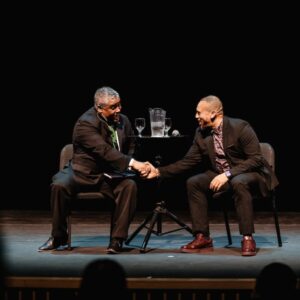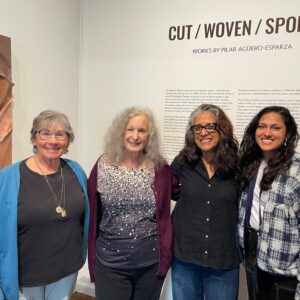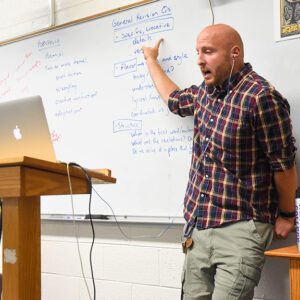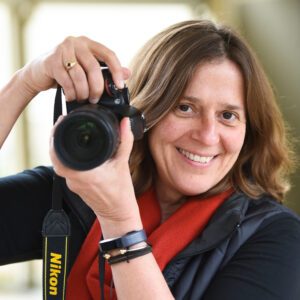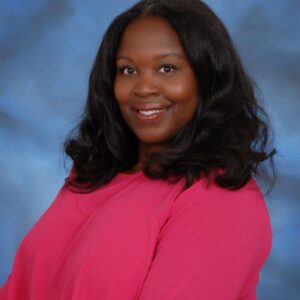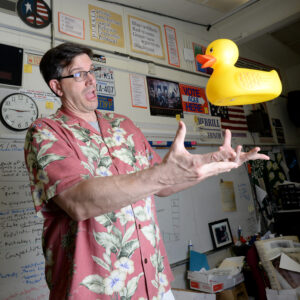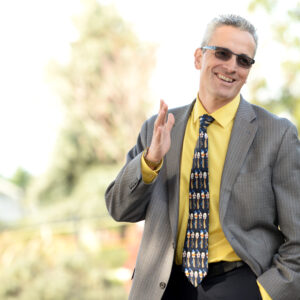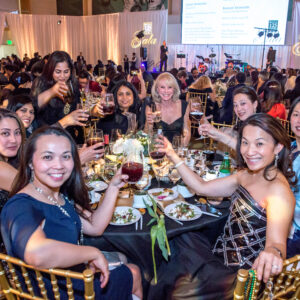This story originally appeared in the Spring/Summer 2023 issue of Harker Magazine. It is also available to read on issuu.
Hannah Joy Sachse, grade 6, was given a prompt, guidelines and some feedback. When her Creative Writing class at Harker’s summer camp last year was complete, she had a poem that meant something to her.
“I was really proud of my piece,” she said. She keeps it still. It begins:
I am from the bushes of flowering roses
From the singing of choirs and the chanting of Torah
I am from the cozy, close family and the warmth of laughter
More students go through Harker’s summer program than are enrolled at Harker during the school year, because the camp is open to non-Harker students as well. They each leave with something lasting. Perhaps it’s a friendship, a piece of knowledge, a new move on the court or more confidence.
Those moments or revelations are the byproducts of the work that takes place to pull it all off each year.
When Cindi Gonsalves feels overwhelmed managing Harker’s 2,500 summer students, 300 staff and untold behind-the-scenes hiccups, she goes for a walk. She doesn’t escape the activity, she walks into the middle of it. From her office on the lower campus, Gonsalves sits down and watches – not to evaluate, but just to enjoy the children.
“It just reinforces why I do this,” said Gonsalves, Harker’s summer director for 25 years. “They’re running around, they’re playing with their friends and engaging with staff members. Just watching them laugh and smile and have a good time … that makes me feel like my hard work has paid off.”
With the addition of Speech and Debate, Harker Summer now consists of eight programs, including those for kindergartners, and elementary, middle and upper school students, plus the English Language Institute, Summer @ The Conservatory and Swim School.
The soundtrack to the Harker summer experience comes from the yelling reverberating off the lower school gym’s walls during “Color Clash.”
“Red! Red! Red!”
“Blue! Blue! Blue!”
Dozens of kids, dressed in team colors, erupt in an exuberant end-of-the day competition of silly games and serious team spirit.
What makes Harker Summer unique is the passion instructors bring to the classes they teach. Investigating Untold Histories, taught by middle school history teacher Arturo Perez, is one such example, focusing on overlooked events and characters.
In Engineer It!, middle school students take on engineering challenges and solve problems. In Adulting 101, high school students learn life skills like how to change a flat tire, save money and prepare for a job interview.
Offerings range from the fun (Sweets, Treats and Yummy Eats) to the mysterious (Fantasy Fiction) to the academic (Honors Algebra 2/Trigonometry). Some are reviews of school-year academic classes. Others are based on the imagination of the classes’ creators.
For example, the course description for the middle school class You’re Wrong! Here’s Why reads, “By the end of this course, students will be able to make a convincing case for whatever they desire, whether at home or in school!” “We’ll look in our community and see what classes our students need,” said Alison Ung ’10, summer middle school co-principal and summer school alum. “Our most basic and unchanging curriculum is our math, but other classes are teacher-passion driven, whether it’s entomology based around Pokémon, or sewing or manga drawing. That’s really our community coming together and saying, ‘I really want to teach this.’”
Daniel Green, grade 6, a Harker summer camper since preschool, works with his parents to blend academic classes with ones that follow his own interests. Last year, his parents chose Ramp Up Your Reading and Pre-Algebra for his first summer session. A fan of Japanese anime, Green chose Manga Art and Build Your Own Podcast for his second session.
“You actually make a podcast,” he said. “It was really fun. You partner up and say what you want to talk about. Then you edit the podcast and share it with your teacher.
“We talked about news around YouTube and social platforms. We had three episodes of about 15-20 minutes each. On the last day, we would get to listen to everyone’s podcast. I think they thought ours was really cool.”
Through Ramp Up Your Reading, “He learned to enjoy reading and not to make it a chore,” said Green’s mother, Sparkle Jones. “He learned to comprehend what he was reading and not just put in the time.” As for pre-algebra, Green said he moved up a math level this year, and the summer class was among the building blocks that allowed him to get there.
“It’s a nice blend of academic and what you think of as quintessential summer,” said Julie Sachse, whose four children were Harker campers. “People send their kids to Harker Summer because they want them to keep one foot steeped in academics so they don’t have a summer slide. But they do it in such a way that’s learning-based and not pressure-filled. “And, in the afternoon, it’s pure summer, from archery to swimming to theme days to water fights. It’s just super fun. They make it magical for those kids.”
I am from the taste of melting cheese tortillas and the mushy, saucy pizza
I’m from the touch of smooth hugs and kindness of others
I’m from “How was your day?” and the sight of familiar, smiling faces
Hannah Sachse’s words were inspired by the prompts of her Creative Writing teacher, to consider senses and imagery. It helped her to meet a friend in the class named named Ynez. They sat next to each other and shared ideas and laughed at each other’s jokes.
“We collaborated really well together,” Hannah said. “That’s how we became friends.” Diversity of schools represented by the students is a summer goal. Friendships are made and renewed each summer with students who don’t attend Harker during the school year.
“I’ve made a lot of friends through summer camp,” said Green, a Harker student. “Making new friends actually helps me make so many more, because that one friend will introduce me to way more people.”
Julie Cheng’s children, Trevor and Isabel, from Los Gatos schools, always look forward to their Harker summers.
“I enjoy the variety of classes they offer,” Julie said. “Trevor took the History of Fashion last summer. He picked a topic of the fashion history of SpongeBob SquarePants. Kudos to the teacher who dealt with my son’s wacky sense of humor. She was very accommodating and made it work.
“I’m not looking for purely academic,” she added. “I’m looking to have a balance. I love the quirky classes that my son and daughter have done over the years. Everyone has to find their own niche, what they feel their kid wants or needs at that time. It’s really up to them.”
Once the students step onto the Harker campuses, it’s not just about classes for the parents. It’s about safety and security, knowing that their children will be taken care of physically and emotionally.
“As a helicopter mom, it takes a lot to be able to trust when I drop off my children,” Julie Sachse said. “But knowing that they were in such capable, kind, caring and compassionate hands … I can’t even tell you.”
“What I appreciate as a mom is that it’s a very secure school,” Jones said. “Staff opens your car door. You see security out front. It just makes you feel secure knowing that they really do take the child’s safety seriously.”
The staff, including junior staff and counselors in training, seek to connect with every camper.
“There are children who are going to be loud and happy,” Gonsalves said. “But there are also children who are introverted. One of our goals is that everybody feels like they belong here. If we see a child off by themselves and not really connected with other kids – maybe they’re new to the camp – the staff members and teachers need to make sure that those connections are made.”
Many come to Harker only for the summer and are welcomed back as old friends.
“It’s their summer family,” Gonsalves said.
English Language Institute students come from China, Japan and Korea. Connections, especially through language barriers, are vital. When ELI principal Joe Chung needed a quality teacher for a three-hour online class with Japanese students on Friday evenings (to line up with Saturday mornings in Japan), Karen Glovka, a longtime Spanish teacher in the lower school, came forward. After that introduction to the summer program, she is now among three ELI teachers administering full in-person classes this summer.
“The first couple of days can be overwhelming as they learn to navigate campus, eat new foods, play new games and make new friends – all in English,” Glovka said. “However, by the third or fourth day, we are settling into our new routines and the kids are having so much fun they protest when it’s time to go home.”
Glovka said a highlight was teaching a fourth-grader who arrived with significant learning differences. Customization was required for everything.
“Since we have so many great resources here at Harker, it was doable, and he had a great summer,” Glovka said. “His parents were very appreciative.”
For Laura Lang-Ree, Harker’s performing arts director, the summer program offers a chance to work more intensively with those as young as fourth grade.
“Summer is a different vibe,” Lang-Ree said. “There’s just a freedom and lightness and carefreeness behind a whole lot of fantastic theater education that we can have because we get them all day, as opposed to just an afternoon or a 40-minute class period.”
She wanted to develop a summer program that matched what her own children experienced with such organizations as the Peninsula Youth Theatre and the now defunct Children’s Theatre Company.
Rather than do the day-to-day teaching herself, Lang-Ree assembled a team so experienced and skilled in teaching that she settles more into the planning. This allows her to be there every day for the students and “just to get to know them and have fun with them,” she said.
Pulling together a musical theater production in three weeks, as the Intensive high school group will do, borders on the unthinkable, but “they nail it,” she said. “We’re very much envelope pushers in terms of the content of the performances. We love to push the envelope. … These kids are rock stars.”
In the summer program planning stages, Gonsalves and her team continually ask: “Can we pull this off?”
The first response usually is “Yes.”
For example, “We offered a new class last year called Becoming a Social Media Marketing Mogul,” Ung said. “The idea sounded really cool to start with.”
Then, the teacher proposed this idea: “I wonder if I can get someone from a local company to evaluate their final product?”
Ung agreed to try it, and the result was a partnership with Philz Coffee.
“Philz had the kids try to create an advertising campaign,” Ung said. “They sent over a bunch of coffee and the kids worked on different angles. … Of course, the entire room smelled like coffee. It was something we didn’t know was possible until we tried it. And it was amazing.”
Creative thinking combined with trial and error streamlines the curriculum the students are offered.
Gonsalves attends all the Conservatory’s summer productions, and cries at the lower school’s end-of-summer slide show. Her work doesn’t end when the last tear falls. There’s cleaning up classrooms, finalizing payroll and taking care of loose ends.
“I don’t relax until September or October,” she said. By then, the new school year is in full swing. But the Harker Summer memories remain, sometimes in the form of prose through the pen of a young student.
I’m from the dancing of flames and the smell of baking desserts
From coolness of summer pools and triumphant cheers
I’m from the wild wind howling and the rain with more water than the oceans,budding into who I will be and who I am.
David Kiefer is a freelance writer and former journalist at the San Jose Mercury News.



